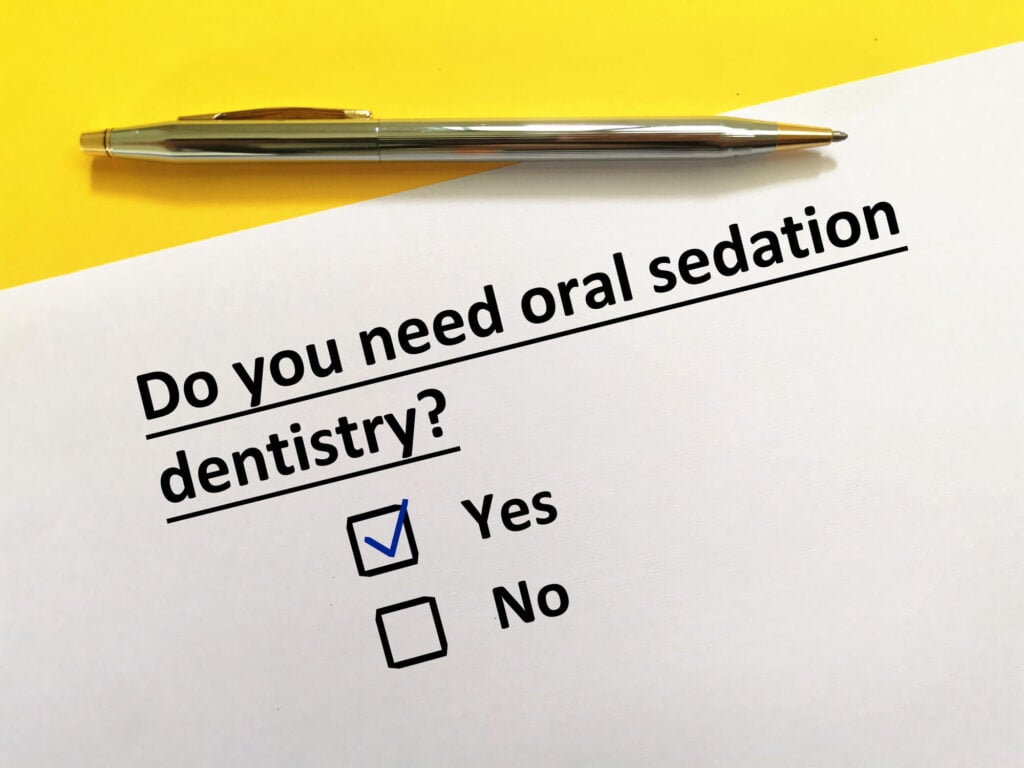If the thought of visiting the dentist leaves you feeling uneasy, don’t worry – you’re not alone, and there is a solution. Walnut Creek Sedation dentistry can be a game-changer. It offers a path to comfortable and stress-free dental visits, making general dentistry procedures much more manageable.

Questions to Ask About Sedation Dentistry
What types of sedation options are available for dental procedures?
Dental sedation offers a range of options to cater to different levels of anxiety and comfort preferences:
- Nitrous Oxide (Laughing Gas): This is a mild sedative inhaled through a mask. It induces a relaxed state without causing unconsciousness and is often used for less anxiety-inducing procedures.
- Oral Sedation: Your dentist can prescribe oral sedatives in pill form, usually taken before your appointment. It offers a moderate level of sedation and is suitable for patients with moderate anxiety.
- Intravenous (IV) Sedation: Administered through an IV line, this form of sedation provides a deeper level of relaxation. It’s highly effective for those with severe dental anxiety or complex procedures.
- General Anesthesia: Reserved for extensive dental surgeries, general anesthesia renders the patient completely unconscious, ensuring they feel no discomfort during the procedure.
How do I know if I’m a suitable candidate for sedation dentistry?
Sedation dentistry is an excellent option if you experience dental anxiety, fear, or have a low pain threshold. It’s also suitable if you have a strong gag reflex or difficulty sitting still for extended periods.
Candidates for sedation dentistry should be in good overall health, with no contraindications for the chosen sedation method. However, it’s essential to consult with your dentist to assess your specific needs and determine the most appropriate sedation option for your case.
What are the benefits of using sedation during dental procedures for anxious patients?
Sedation dentistry offers several significant benefits for anxious patients.
- Reduces Anxiety: Sedation helps alleviate dental phobia and anxiety, making it easier for patients to receive necessary dental care.
- Enhances Comfort: It ensures a painless and comfortable experience, even during more extensive procedures.
- Improves Cooperation: Patients are more likely to cooperate during treatment, reducing the risk of complications and the need for repeat appointments.
- Minimizes Memory: Some forms of sedation, like IV sedation, can result in partial or complete memory loss of the procedure, which can be reassuring for those with dental fear.
- Saves Time: Sedation can allow for multiple procedures to be completed in one session, reducing the number of visits to the dentist.
Sedation dentistry is a valuable tool in providing high-quality dental care while prioritizing the comfort and well-being of patients who struggle with dental anxiety or fear.
Are there any potential risks or side effects associated with dental sedation?
While dental sedation is generally safe and well-tolerated, it’s essential to be aware of potential risks and side effects:
- Sedation Depth: The depth of sedation must be carefully monitored to avoid over-sedation or inadequate sedation, both of which can pose risks.
- Allergic Reactions: In rare cases, patients may be allergic to the sedation medication, leading to adverse reactions.
- Breathing Issues: Some forms of sedation can depress respiration, particularly if the dosage is too high. Monitoring is crucial to ensure proper oxygen levels.
- Postoperative Effects: Patients may experience temporary side effects such as dizziness, nausea, or confusion after the procedure.
- Interaction with Medications: Inform your dentist of any medications or supplements you are taking to prevent potential drug interactions.
- Medical Conditions: Patients with certain medical conditions should be carefully evaluated before undergoing sedation to ensure it is safe for them.
It’s crucial to discuss your medical history and concerns with your dentist thoroughly to minimize these risks and ensure a safe sedation experience.

Which sedation method would you recommend for my specific anxiety level and dental needs?
The choice of sedation method depends on your individual anxiety level, the complexity of the dental procedure, and your personal preferences. Nitrous oxide is suitable for mild anxiety, while oral sedation offers a moderate level of relaxation.
Intravenous (IV) sedation provides a deeper level of sedation and is ideal for those with severe anxiety or extensive treatments. General anesthesia renders patients completely unconscious and is typically reserved for complex surgeries.
Your dentist will assess your specific needs and medical history to recommend the most appropriate sedation method that ensures your comfort and safety throughout the procedure.
How is the dosage of sedation determined to ensure my comfort and safety?
The dosage of sedation is determined based on various factors, including your age, weight, medical history, anxiety level, and the type of procedure being performed. Dentists carefully calculate the dosage to achieve the desired level of sedation while prioritizing your comfort and safety.
During your initial consultation, your dentist will discuss your medical history, evaluate your anxiety level, and consider the nature of the dental work. Based on this assessment, they will determine the appropriate dosage of sedation medication.
Monitoring your vital signs throughout the procedure ensures that adjustments can be made if necessary to maintain your comfort and safety.
Your dentist’s expertise and experience in administering sedation are crucial in ensuring that you receive the right dosage for a worry-free dental experience.
Will I be conscious during the procedure, or will I be completely asleep?
The level of consciousness during a procedure involving sedation depends on the type of sedation used. With options like nitrous oxide (laughing gas) and oral sedation, patients typically remain conscious but deeply relaxed and comfortable.
You’ll be able to respond to instructions and communicate with the dental team if needed. In contrast, general anesthesia results in complete unconsciousness, where you won’t be aware of the procedure.
Is there any preparation or specific guidelines I should follow before receiving sedation?
Yes, there are often preparation guidelines. Your dentist will provide specific instructions, which may include fasting for a certain period before the procedure, arranging for transportation to and from the appointment if you’ll be receiving deeper sedation, and disclosing any medications or medical conditions.
It’s crucial to follow these guidelines carefully to ensure your safety and the effectiveness of the sedation. Your dentist will give you clear guidance to make the process as smooth as possible.

Interested in Walnut Creek Sedation Dentistry?
Overcoming dental fear and anxiety is possible with the help of sedation dentistry. By asking these vital questions and discussing your concerns with your dentist, you can take the first step towards a more comfortable and stress-free dental experience. Don’t let fear prevent you from maintaining your oral health.
Contact Coliseum Dental Walnut Creek today to schedule an appointment and experience the difference that sedation dentistry can make in your dental journey. Your smile and peace of mind are worth it!



